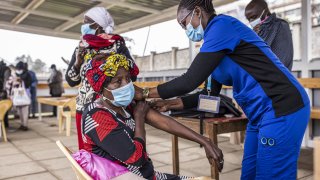
AstraZeneca’s Covid-19 vaccine is administered at Mbagathi Hospital in Nairobi, Kenya, on July 6, 2021.
- Almost all of the up to 900,000 Covid cases sequenced worldwide over the last 60 days originated from the delta strain, Maria Van Kerkhove, the WHO's technical lead on Covid, said.
- Europe accounted for roughly 60% of the more than 3.3 million new cases in the world last week, Van Kerkhove said.
- Covid cases worldwide have been increasing over the last four consecutive weeks, she added.
The delta variant, first detected in India a little less than a year ago, now represents 99% of sequenced Covid-19 cases globally, making it more prevalent than any other strain, officials from the World Health Organization said Tuesday.
WATCH ANYTIME FOR FREE
>Stream NBC10 Boston news for free, 24/7, wherever you are. |
Almost all of the up to 900,000 Covid cases sequenced worldwide over the last 60 days originated from the delta strain, Maria Van Kerkhove, the WHO's technical lead on Covid, said during a Q&A streamed on the organization's social media channels. Van Kerkhove's comments come amid an international increase in Covid infections driven by surging cases in Europe. The Continent accounted for roughly 60% of the more than 3.3 million new cases in the world last week, Van Kerkhove said.
"Delta is really the dominant one," Van Kerkhove said. "And there are two variants of interest – mu and lambda – that we've been tracking as well, but again, where delta is present, delta takes over."
Get updates on what's happening in Boston to your inbox. Sign up for our >News Headlines newsletter.
Van Kerkhove said Europe represented more than half of the just under 50,000 global Covid deaths in the last week, a 5% increase in fatalities across the Continent. Covid cases worldwide have been increasing over the last four consecutive weeks, she added.
"The pandemic is heading in the wrong direction at the moment," Van Kerkhove said.
Money Report
The decreased use of masks and social distancing are to blame for Europe's surge, Van Kerkhove said at a briefing last week. She cautioned Tuesday that societies reopening across the Northern Hemisphere this winter could lead to a rise in respiratory illnesses over the months ahead, including influenza and other pathogens.
Select European countries are bearing the brunt of the surge. Germany set a record seven-day average of nearly 39,300 new cases on Monday, up almost 40% from the week before, according to a CNBC analysis of data from Johns Hopkins University.
The U.K. tallied a weekly average of more than 38,500 new cases Monday, an increase of 13% from the previous week. Seven-day averages in France and Italy were both up by nearly 40% as well.
Russia also saw a pandemic high seven-day average of roughly 1,199 deaths on Monday, Johns Hopkins reported. But its seven-day average case count, over 38,000 infections, decreased by more than 2%.
Correction: Russia saw a pandemic high seven-day average of roughly 1,199 deaths on Monday. An earlier version mischaracterized the figure.






